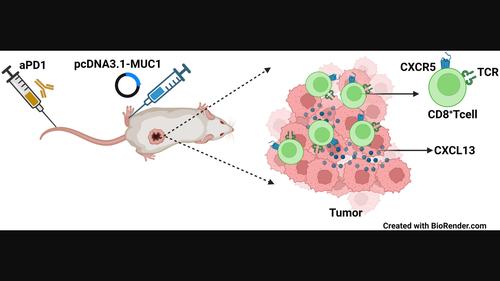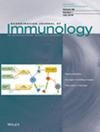Unlocking PD-1 antibody resistance: The MUC1 DNA vaccine augments CD8+ T cell infiltration and attenuates tumour suppression
IF 4.1
4区 医学
Q2 IMMUNOLOGY
引用次数: 0
Abstract
In light of increasing resistance to PD1 antibody therapy among certain patient populations, there is a critical need for in-depth research. Our study assesses the synergistic effects of a MUC1 DNA vaccine and PD1 antibody for surmounting PD1 resistance, employing a murine CT26/MUC1 colon carcinoma model for this purpose. When given as a standalone treatment, PD1 antibodies showed no impact on tumour growth. Additionally, there was no change observed in the intra-tumoural T-cell ratios or in the functionality of T-cells. In contrast, the sole administration of a MUC1 DNA vaccine markedly boosted the cytotoxicity of CD8+ T cells by elevating IFN-γ and granzyme B production. Our compelling evidence highlights that combination therapy more effectively inhibited tumour growth and prolonged survival compared to either monotherapy, thus mitigating the limitations intrinsic to single-agent therapies. This enhanced efficacy was driven by a significant alteration in the tumour microenvironment, skewing it towards pro-immunogenic conditions. This assertion is backed by a raised CD8+/CD4+ T-cell ratio and a decrease in immunosuppressive MDSC and Treg cell populations. On the mechanistic front, the synergistic therapy amplified expression levels of CXCL13 in tumours, subsequently facilitating T-cell ingress into the tumour setting. In summary, our findings advocate for integrated therapy as a potent mechanism for surmounting PD1 antibody resistance, capitalizing on improved T-cell functionality and infiltration. This investigation affords critical perspectives on enhancing anti-tumour immunity through the application of innovative therapeutic strategies.

解除 PD-1 抗体的抗药性:MUC1 DNA 疫苗可增强 CD8+ T 细胞浸润并减弱肿瘤抑制作用
鉴于某些患者群体对 PD1 抗体治疗的耐药性不断增加,因此亟需进行深入研究。我们的研究采用小鼠 CT26/MUC1 结肠癌模型,评估了 MUC1 DNA 疫苗和 PD1 抗体在克服 PD1 抗药性方面的协同作用。在单独治疗时,PD1 抗体对肿瘤生长没有影响。此外,瘤内 T 细胞比例或 T 细胞功能也没有发生变化。相比之下,单独注射 MUC1 DNA 疫苗可通过提高 IFN-γ 和颗粒酶 B 的产生,显著增强 CD8+ T 细胞的细胞毒性。我们令人信服的证据表明,与单一疗法相比,联合疗法能更有效地抑制肿瘤生长并延长生存期,从而缓解了单药疗法固有的局限性。肿瘤微环境的显著改变推动了疗效的增强,使其向有利于免疫原性的条件倾斜。CD8+/CD4+ T细胞比率的提高以及免疫抑制性MDSC和Treg细胞群的减少都证明了这一点。在机理方面,协同疗法提高了肿瘤中CXCL13的表达水平,从而促进T细胞进入肿瘤环境。总之,我们的研究结果主张将综合疗法作为克服 PD1 抗体耐药性的一种有效机制,利用改善的 T 细胞功能和浸润。这项研究为通过应用创新治疗策略增强抗肿瘤免疫力提供了重要的视角。
本文章由计算机程序翻译,如有差异,请以英文原文为准。
求助全文
约1分钟内获得全文
求助全文
来源期刊
CiteScore
7.70
自引率
5.40%
发文量
109
审稿时长
1 months
期刊介绍:
This peer-reviewed international journal publishes original articles and reviews on all aspects of basic, translational and clinical immunology. The journal aims to provide high quality service to authors, and high quality articles for readers.
The journal accepts for publication material from investigators all over the world, which makes a significant contribution to basic, translational and clinical immunology.

 求助内容:
求助内容: 应助结果提醒方式:
应助结果提醒方式:


